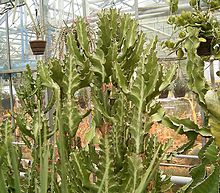Euphorbia lactea is a species of spurge native to arid and subtropical regions of South Asia, mainly the Indian Subcontinent.[3] Common names include mottled spurge,[4] frilled fan, elkhorn,[5] candelabra spurge,[4] candelabrum tree, candelabra cactus, candelabra plant, dragon bones,[4] false cactus,[4] hatrack cactus,[4] milkstripe euphorbia, mottled candlestick.
| Euphorbia lactea | |
|---|---|

| |

| |
| Variegated form, Euphorbia lactea 'White Ghost' (below) | |
| Scientific classification | |
| Kingdom: | Plantae |
| Clade: | Tracheophytes |
| Clade: | Angiosperms |
| Clade: | Eudicots |
| Clade: | Rosids |
| Order: | Malpighiales |
| Family: | Euphorbiaceae |
| Genus: | Euphorbia |
| Species: | E. lactea
|
| Binomial name | |
| Euphorbia lactea | |
Description
editIt is an erect shrub growing up to 5 metres (16 ft) tall, with succulent branches 3–5 centimetres (1.2–2.0 in) diameter, ridged, with a triangular or rhombic cross-section; the ridges are spiny, with short, permanent spines up to 5 millimetres (0.20 in) long. The leaves are minute, and soon deciduous.[3] All parts of the plant contain a poisonous milky latex, containing several irritating alkaloids, such as phorbol.[6]
Cultivation
editIt is used medicinally in India.[7] It is widely grown as an ornamental plant, both in the tropics, and as a houseplant in temperate regions; a number of cultivars have been selected for ornamental use, notably 'Cristata' with frilled branching.[3][8]
References
edit- ^ de Kok, R. (2023). "Euphorbia lactea". IUCN Red List of Threatened Species. 2023: e.T206406144A206909196. doi:10.2305/IUCN.UK.2023-1.RLTS.T206406144A206909196.en. Retrieved 1 April 2024.
- ^ "Appendices | CITES". cites.org. Retrieved 2024-01-17.
- ^ a b c Huxley, A, ed. (1992). New RHS Dictionary of Gardening. ISBN 0-333-47494-5
- ^ a b c d e "Euphorbia lactea". Germplasm Resources Information Network. Agricultural Research Service, United States Department of Agriculture. Retrieved 16 January 2018.
- ^ Euphorbia lactea f. cristata Llifle.com. Retrieved 1 December 2024.
- ^ Poisonous plants: Euphorbia lactea Archived 2009-06-03 at the Wayback Machine
- ^ Plant of the Week.org Euphorbia lactea
- ^ Pacific Island Ecosystems at Risk: Euphorbia lactea
